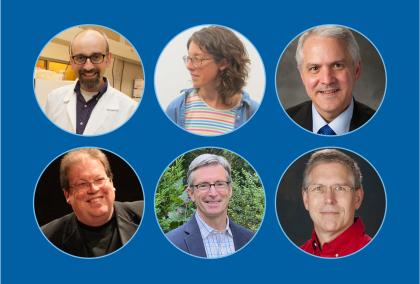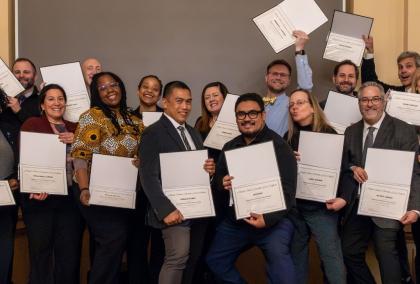Fulbright Distinguished Awards in Teaching Program in the Midst of COVID-19
By Mika Vähäkuopus
Published on July 17, 2020
It had taken me a few weeks to adjust to my new environment in Tempe, Arizona. I got to know a lot of new people: my roommates and the rest of the international cohort, the staff at Arizona State University (ASU) and North High in Phoenix, my friendship family, etc. I moved through the worst part of homesickness and was enjoying myself taking part in the Fulbright Distinguished Awards in Teaching Program. I had established a nice daily rhythm and everything was going smoothly with the studies, the inquiry project and the cultural activities. It was early March and it was time to make use of the well-deserved spring break.
"I didn’t think much of the decision and told people back home that I would definitely stay in Arizona once I got back from Texas."
I decided to fly to Dallas and take a week-long roadtrip in Texas. However, while I was enjoying myself in the beautiful city of Austin, ASU informed us, that as a precaution for the global coronavirus pandemic, all classes would be moved online. I didn’t think much of the decision and told people back home that I would definitely stay in Arizona once I got back from Texas. I thought I would be safe staying there and that I would return in June as planned.
These were my thoughts even after spring break as I discussed the situation with my roommates. On the Monday after the break, my biggest worry was where to get toilet paper. In the nick of time I was able to hunt down the most expensive rolls I had ever bought!
From this point on, however, things developed so fast that I had trouble keeping up. First, IREX recommended that everyone seriously consider returning home. Next, I realized that flights back to Finland would soon be cancelled and there would be no guarantee that things would improve by the end of the program in May. Consequently, on Tuesday after spring break I let IREX know that I would be ready to leave early the following week; I wanted a few days to get myself ready.
It wasn’t as simple as that, though. The situation in the US, as well as globally, deteriorated so fast that on Wednesday I told IREX that I would be ready to go by the weekend. What followed were some of the most nerve-wracking days of my life. It seemed that everyone else got their tickets but I didn’t hear back from IREX. I was starting to think that I had ruined my chances for returning by asking for tickets for the following week. Meanwhile, I did my best to prepare for a quick departure: I packed my bags, cleared my room and the kitchen, said my goodbyes, closed my bank account and transferred my money to Finland. This took a couple of days, but it all got done by Thursday afternoon. I even managed to donate the expensive toilet paper to the ones staying in Arizona.
Finally, early Thursday evening I got my tickets: my flight out of Phoenix would leave at 6am the following morning. This was a huge relief, but I still had four flights and 46 hours of travel ahead of me. Somehow I couldn’t quite relax yet. Waiting for my flight to London at JFK was a strange experience: the airport was almost deserted with only a few flights departing and arriving. As a born pessimist, I was sure that my flight would get cancelled, too.
"I would say that the reverse culture shock of returning home was harder than the initial one when I arrived in the U.S."
Everything went according to plan, however, and on Sunday morning I arrived in Oulu, Finland, completely exhausted and disoriented, but relieved and happy, too. The following days I was lost: so much had happened during the past few days that I couldn’t really place myself. In short, I didn’t know where I was. In these special circumstances, I would say that the reverse culture shock of returning home was harder than the initial one when I arrived in the US. It took much longer to get over this shock than to get over the jetlag, but once I did, I felt extremely happy to be home.
At the same time I was sad and disappointed for many reasons. First, I had to leave behind a few very good new friends and, as everything happened so abruptly, we didn’t have time to get ready to say goodbye. In addition, I had made a lot of plans for the coming couple of months: a conference trip to Denver, a visit to the Grand Canyon and Monument Valley with our cohort, a three-week trip with my wife at the end of the program visiting several states, concert tickets, and games. I was also looking forward to enjoying the Arizona spring and finishing my studies. All the time I had spent planning these activities turned out to be time wasted.
Once I had survived the shock of the abrupt return, I continued working on my inquiry project, and managed to finish it, present it and submit it in time. But I must admit that I couldn’t really find the motivation to continue my other assignments. I took part in some, but basically I felt that finishing the project would be enough. Fortunately, I had been able to make use of the 2,5 months in Arizona when it comes to the other parts of the program.
All in all, as the pandemic kept evolving over the spring, it was obviously better to be home and I adjusted to taking it easy as I would only return to work in August.
Mika Vähäkuopus
Oulu University Teacher Training School
Fulbright Distinguished Awards in Teaching 2020, Arizona State University


